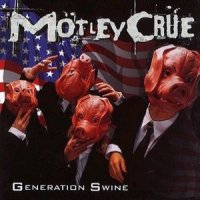
MÖTLEY CRÜE
Generation Swine
![]()
Elektra (1997)
Rating: 6/10

|
So, after the short-lived love affair with former The Scream vocalist John Corabi, Mötley Crüe reunited with blonde bombshell and original frontman Vince Neil for what is undoubtedly their messiest record.
With the grunge scene fading, Crüe found themselves in a nu-metal matrix of industrial-fueled grooves and clanking rhythms. This time round, the four-piece keep the hard edge that Corabi seemed to instil within them, and coat it with gluey glitter.
There’s a heavy focus on futuristic dynamics while still trying to accommodate that distinctive Vince Neil whine which in the past had seemed more suited to dirty riffs and songs about girls and alcohol. Neil seems lost in the mix this time round, while all around him the band rattle out something akin to a groove-based kaleidoscope of noisy grunge.
Album opener ‘Find Myself’ is just a disordered lump that clatters like an oil drum being thrown down a hill. Rarely does it breathe as a song, and neither does ‘Afraid’ with its clanking guitar and tinny drum.
With Nikki Sixx (bass) and Tommy Lee (drums) now shorn of their locks, this is clearly Mötley Crüe trying to step into the “now” and slot alongside the wishy-washy nu-metal brigade. Crüe flirt with experimentalism, meaning of course that anthems are out the window and we are instead mistreated by several laborious, and arty workouts.
In a sense, I can almost – and I say almost – see why the band rushed headlong into those icy cold waters. Metal was dead on its feet and the only bands who were making any noise at the time were Fear Factory and Machine Head, both employing harder dynamics and bombastic grooves.
Although Mötley Crüe somehow adapted to the 90s and outgrew the hair metal scene, this meant a patchy brace of records, from 1994’s self-titled opus to this disorderly cacophony. Even so, this was Crüe colouring the rock ’n’ roll waters a little too much, with Sixx taking lead vocals duties on the watery ‘Rocket Ship’, while Lee threw his hat in the mix with the cringe-worthy ballad ‘Brandon’, featuring some of the band’s worst ever lyrics.
As if these pointless experiments were not enough we were force-fed a hideous remix of old chestnut ‘Shout At The Devil’ (from the 1983 album of the same name), this time round called ‘Shout At The Devil 97’, with its needless layers and noodling, dragged even further down by those jarring, choppy rhythms.
Of course, Crüe being Crüe, there were moments when they did almost get it right. ‘Glitter’ is a wistful ballad – although many fans preferred the more obscure alternative version featured on the single release – but with those electronic sounding beats this was just another attempt at being down with the kids, and the band were quickly losing identity.
‘A Rat Like Me’ saves the day in the sense it’s just a blunt rock ’n’ roller, but with a majority of the tracks on this opus written when John Corabi was still in the band, Vince Neil struggles to fit into the tumultuous proceedings, and, as the wall of sound bleeps, blinks, rattles, smokes and churns around him, he must’ve been feeling like an ill-fitting cog.
Generation Swine is typical of the late 90s, when it was a terrible time to be in a metal band. Tracks such as ‘Let Us Prey’ (guitarist Mick Mars’ best moment) and ‘Confessions’ (with Tommy Lee’s caveman backing vocals) leave me cold, swamped by those god-awful, fuzzy dynamics time and time again. “Electronica” and “alternative” are not words I’d associate with Mötley Crüe, and I hope I never have to use those words again in reviewing one of their albums.
Generation Swine really is the black sheep of the Crüe family, making even the 1994 self-titled opus look brilliant. Thankfully, the meddling wouldn’t last, but it would take three more years before the band – minus Tommy Lee – reverted back to basics.
Neil Arnold





